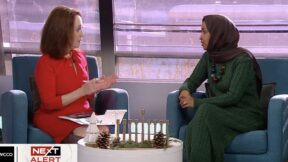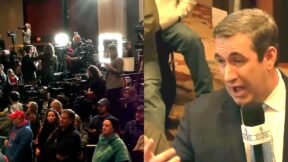Inside Up With Chris Hayes: The Best (And Worst) Part Of Waking Up Weekends
Another key to the show’s success is the chemistry between Hayes and his diverse rotation of panelists, who span the ideological spectrum, but can be tough to pigeonhole because they’re speaking more as individuals. I asked him if he gets guff from fellow liberals for “playing nice” with conservatives.
“We get some guff for conservatives being on the show sometimes,” Hayes says, “less, I think, the principle, and more for what they say, which is totally fair and legitimate. When I see conservatives on TV who say things I don’t agree with, I get angry and respond.”
He explained that the show tries to navigate between the two poles of “principle-less fake centrism, he said/she said ‘objectivity’ in which you exercise no judgment over the veracity of claims,” and “epistemic closure” in which “everything is strictly viewed through a narrow ideological lens,” by having a point of view that Hayes represents and articulates, which becomes the springboard for dialogue.
“People know where I stand, but where I stand is not the sum total of what we’re presenting on the show,” Hayes says. “So we’re trying to negotiate those two extremes. It’s hard, where that line is.”
He explains that sometimes, conservatives will say things on the show that aren’t true, but “if you respond to every little thing, then you stop the train of the conversation.”
One of the “trickier things” about conservatives on the show, Hayes says, is that even though it’s understood he doesn’t agree with them, “in a way, we’re vouching for them, so there is a certain standard” that he says is tough to articulate. “I think it has to do with where they are on the good faith/hackish spectrum.”
All appearances aside, Up is by no means a part-time job. Although it only airs on weekends, the Up staff starts working on each show Wednesday mornings, “even though the show is spontaneous and improvisational,” Hayes explains, “you have to be prepped and read in on” every direction that a topic can take. “We try not to overproduce too early, because you end up spinning your wheels and throwing a lot away, because things happen.”
“Thursday and Friday are pretty long days,” he says, “and on Saturday, I get up around 4:30, I’m in around 5:15. The script is pretty established by then. We stick around Saturday afternoon, prepping Sunday, and sometimes there’s something like a GOP debate Saturday night, and we have to get in early on Sunday.”
Unless he’s got some grind of an interview to do, Hayes normally leaves after a brief post-show meeting with his staff and Executive Producer Jonathan Larsen on Sundays. In observing Hayes’ and Larsen’s interactions with their staff during this week’s post-show meeting, I was struck by the way they all spoke about the show. They didn’t talk about it like a product, like a pack of Twinkies they’re moving to faceless consumers, but rather, like a meal they cooked for friends and guests. It reminded me of the refrain I heard from Phil Griffin, and other MSNBC staff, that Hayes loves what he’s doing, and it shows. The same appears to be true for the rest of the show’s staff.
There’s a lot more to come from my interview with Chris Hayes, but here’s a section in which we discuss the media and where he gets his news, and I ask him the tough questions that have famously tripped up some famous conservatives:
Pages: 1 2
This is an opinion piece. The views expressed in this article are those of just the author.




